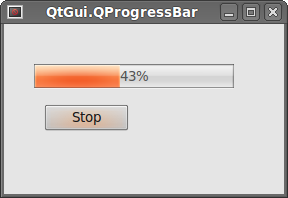QtGui.QProgressBar
A progress bar is a widget that is used when we process lengthy tasks. It is animated so that the user knows that the task is progressing. The QtGui.QProgressBar widget provides a horizontal or vertical progress bar in PyQt4 toolkit. The programmer can set the minimum and maximum value for the progress bar. The default values are 0 and 99.
#!/usr/bin/python
# -*- coding: utf-8 -*-
"""
ZetCode PyQt4 tutorial
This example shows a QtGui.QProgressBar widget.
author: Jan Bodnar
website: zetcode.com
last edited: September 2011
"""
import sys
from PyQt4 import QtGui, QtCore
class Example(QtGui.QWidget):
def __init__(self):
super(Example, self).__init__()
self.initUI()
def initUI(self):
self.pbar = QtGui.QProgressBar(self)
self.pbar.setGeometry(30, 40, 200, 25)
self.btn = QtGui.QPushButton('Start', self)
self.btn.move(40, 80)
self.btn.clicked.connect(self.doAction)
self.timer = QtCore.QBasicTimer()
self.step = 0
self.setGeometry(300, 300, 280, 170)
self.setWindowTitle('QtGui.QProgressBar')
self.show()
def timerEvent(self, e):
if self.step >= 100:
self.timer.stop()
self.btn.setText('Finished')
return
self.step = self.step + 1
self.pbar.setValue(self.step)
def doAction(self):
if self.timer.isActive():
self.timer.stop()
self.btn.setText('Start')
else:
self.timer.start(100, self)
self.btn.setText('Stop')
def main():
app = QtGui.QApplication(sys.argv)
ex = Example()
sys.exit(app.exec_())
if __name__ == '__main__':
main()
In our example we have a horizontal progress bar and a push button. The push button starts and stops the progress bar.
self.pbar = QtGui.QProgressBar(self)
This is a QtGui.QProgressBar constructor.
self.timer = QtCore.QBasicTimer()
To activate the progress bar, we use a timer object.
self.timer.start(100, self)
To launch a timer event, we call its start() method. This method has two parameters: the timeout and the object which will receive the events.
def timerEvent(self, e):
if self.step >= 100:
self.timer.stop()
self.btn.setText('Finished')
return
self.step = self.step + 1
self.pbar.setValue(self.step)
Each QtCore.QObject and its descendants have a timerEvent() event handler. In order to react to timer events, we reimplement the event handler.
def doAction(self):
if self.timer.isActive():
self.timer.stop()
self.btn.setText('Start')
else:
self.timer.start(100, self)
self.btn.setText('Stop')
Inside the doAction() method, we start and stop the timer.
 Figure: QtGui.QProgressBar
Figure: QtGui.QProgressBar


 浙公网安备 33010602011771号
浙公网安备 33010602011771号